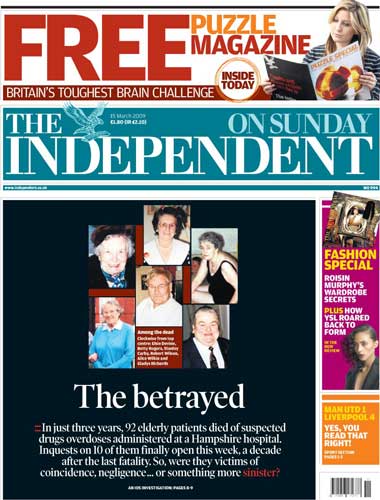Gosport deaths 'not important enough' to justify public inquiry
Questions remain after 92 elderly people died unexpectedly at the same Hampshire hospital, a story first highlighted by <i>The IoS</i> on 15 March

The Government rejected repeated calls for a public inquiry into the unexpected deaths of 92 elderly patients at a Hampshire hospital because it was not of "national importance".
Officials from the Ministry of Justice and the Department of Health refused petitions from a coroner and a senior police officer for a public inquiry in August 2007, according to confidential emails seen by The Independent on Sunday.
But the DoH claimed yesterday that a public inquiry into the deaths at Gosport War Memorial Hospital was refused on the grounds that it would duplicate work done, or under way, by the police and health regulators – a claim rejected by relatives and lawyers.
Several emails from the Portsmouth and South East Hampshire coroner reveal his concern at the Government's decision to refuse a public inquiry into all 92 deaths and instead authorise inquests into just 10.
Relatives maintain that the piecemeal investigations since 1998 by the police, the Crown Prosecution Service (CPS), the local NHS Trust, the General Medical Council and the Commission for Health Improvement have all failed adequately to explain the large number of deaths among patients who were given doses of painkillers and other sedative drugs usually associated with terminal care.
In an email last November to a relative of one of the dead, the coroner, David Horsely, wrote: "Hampshire Police, Hampshire County Council and I all tried to persuade the Government to hold a public inquiry into the deaths but there was no interest whatsoever. Neither was the Government prepared to assist with any additional funding for the inquests."
In another email, Mr Horsley said: "We did try very hard in the public inquiry direction but without any success, despite a face-to-face meeting at the Ministry of Justice in London. The reason for the refusal was that there were no matters of national importance involved.
"Prior to that, I tried to pursue with the CPS why no prosecutions were being undertaken. I understand the CPS decided not to prosecute on the advice of leading counsel. I did ask the CPS for sight of counsel's advice on a number of occasions but they declined to let me see it."
A jury in Portsmouth last week ruled that powerful pain medication had been a factor in five out of 10 deaths at the hospital between 1996 and 1999. But relatives of some of those who died remain unhappy at the way the inquests were conducted. Thirteen deaths were categorised as the most serious by a team of eminent medical experts commissioned by Hampshire Police in 2002 but only some of these cases were included in the inquests. The reason for choosing the 10 deaths while rejecting 82 others has never been fully explained.
Andrew Bradley, the deputy assistant coroner who presided over the 10 inquests, has also been criticised for his refusal to allow damning medical evidence to be submitted. Documents showing concerns among nurses about the widespread use of morphine at Gosport dating back to 1991, as well as an inquiry by a health watchdog that found systemic failings in the prescribing and monitoring of powerful drugs, were excluded.
An independent review to establish whether the death rates at Gosport were abnormally high has been suppressed since 2002 despite repeated requests for it to be made public.
One of the excluded reports was by Professor Gary Ford in 2001, an expert in pharmacology. Writing about Arthur Cunningham, 79, who died on Dryad Ward in September 1998, he concluded: "The initial prescription of subcutaneous diamorphine, midazolam and hyoscine by Dr Barton was in my view reckless... I consider the doses of these drugs most likely contributed to his death through pneumonia and/or respiratory distress."
Last Friday, Action against Medical Accidents (Avma), a charity representing some of the 92 families, made a formal application to Health minister Ann Keen to reconsider the decision not to hold a public inquiry.
Peter Walsh, chief executive of Avma, said: "Why also does the Department of Health continue to fuel conspiracy theories by not allowing access to key documents?"
John White, a solicitor from law firm Blake Lapthorn, is urging the other 82 families to come forward. He said: "Until the authorities really understand and acknowledge what went on in Gosport, the families are bound to be left with feelings of injustice, anger and mistrust. Public inquiries were held in the cases of Shipman, Beverley Allitt, Alder Hey and Bristol, which all happened around the time of Gosport. Why then does Gosport not merit a public inquiry?"
Gladys Richards: No inquest yet
The death of Gladys Richards, 91, in 1998 triggered the first police and hospital inquiries after a campaign by her daughter. The Independent Police Complaints Authority upheld claims that inquiries had not been handled competently. Mrs Richards's case was not among the 10 inquests so far held, but permission for one was granted after lawyers intervened.
Join our commenting forum
Join thought-provoking conversations, follow other Independent readers and see their replies
0Comments